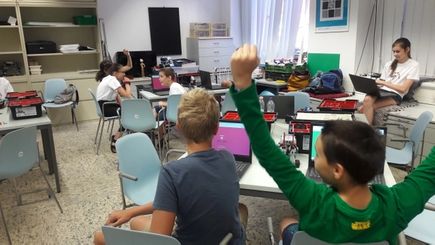ELTE T@T
There is a fast-growing community of teachers, students and computer science academics working with the micro:bit in Hungary.

One of the most active is the ELTE T@T Lab which is run at Eötvös Loránd University in Budapest. The lab, which focuses on teaching and research and development on innovative technology, is operated within the Department of Media & Educational Technology at the Faculty of Informatics.
Professor Andor Abonyi-Tóth with colleagues Zsuzsa Pluhár and Márta Turcsányi Szabó deliver workshops to students and their teachers in using the micro:bit.
Programme design and materials
The ELTE T@T lab can cater to up to 20 children at a time while supporting teachers with ideas and inspiration. Workshop content supports using micro:bit and accessories in teaching time as well as in extra-curricular contexts.
The team note that this workshop format and using the micro:bit as a tool is an extremely good magnet for students and a valuable tool to stimulate change in education practice. In all of their work with teachers through workshops and competitions they stress the importance of the teacher’s role as more of a guide or facilitator rather than the traditional role of provider of the information.
Wandering micro:bits
The lab also offers a lease programme for devices where schools can loan and use micro:bit freely for a month. To support the initiative, Arm Hungary donated 20 micro:bit class sets and 20 buggies to support the “wandering micro:bit project” where devices are loaned then sent from one school group to the next throughout the country.
The team published a research paper on this project in 2019.
Lessons and pedagogy
- The T@T lab provides teachers with the classroom activities which can be differentiated to suit individual learner’s needs, helping groups make advanced projects to extend the learning
- They offer of material and resources translated to Hungarian for a variety of programming languages: they have adapted Logo languages (superlogo) (which is on the national curriculum) as well as Scratch and Microsoft MakeCode
- T@T “hut” is an additional strand to the lab offering which provides further online activities and in-person opportunities for students in the local area
Impact and results
- By summer 2019, 106 schools had participated in workshops or used the micro:bit in schools as part of one-month loan programme
- This reach expanded to 200 schools in the academic year 2019/20
- 15,000+ students have participated in camps and workshops at the lab and in school, across primary and secondary
- Since launching in 2016, the team has received a lot of support and encouragement from university leadership who have highlighted the lab’s impact to the wider university
- As a result neighbouring institutions are now exploring similar activities